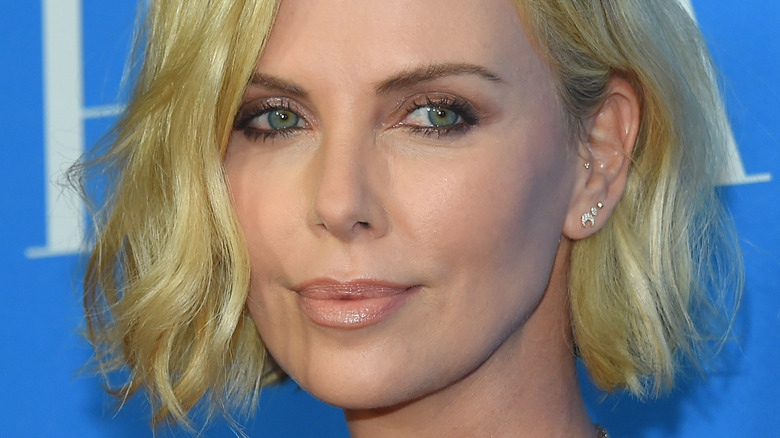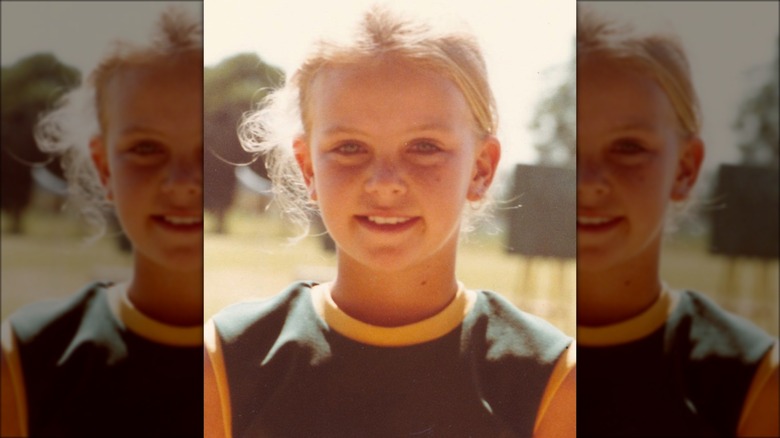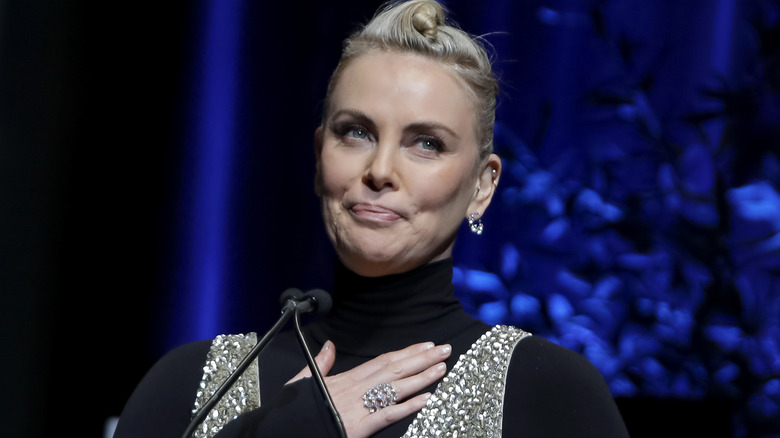The Truth About Charlize Theron's Childhood In South Africa
Listening to Charlize Theron speak in interviews may be misleading, because while she speaks with an American accent, she was raised in South Africa. "I didn't grow up in America," she told Harper's Bazaar in September, while discussing the difficulties of raising two children stateside. "My education was just so different than what my kids are having in America," the "Mad Max: Fury Road" actor added. Theron grew up during Apartheid, which not only shaped her childhood, but impacted her political views, as she was surrounded by "turmoil" in her youth.
The former model may have left her homeland to pursue a career in the entertainment industry, but she never forgot where she came from. "I have a very, very strong connection to my country and to its people," Theron told British GQ in 2016. Success in Hollywood allowed the A-lister to use her influence to advocate for South Africa. "I'm constantly trying to win its love back," she joked to GQ.
Even though she left her native land as a teenager, Theron was old enough to recognize the racial injustices taking place at a young age. "I obviously am a white person who benefited from my white privilege," she told Variety in 2019. "I grew up during the Apartheid era, I benefited from it." Despite her privileges, the actor's childhood was anything but ideal, as Theron endured multiple tragic events.
Why Charlize Theron's mother killed her father
The following includes descriptions of violence and domestic abuse.
Charlize Theron grew up on a farm outside Johannesburg, which her family owned. The majority of the workers were Black, and lived on the property with their families, but that was a source of friction in South Africa at the time. "I had friends whose father would be for apartheid and once they found out that black people lived on our farm wouldn't let me come over for a sleepover," she told NPR in 2019. Years later, during therapy, the "Atomic Blonde" actor realized she "had a lot of trauma" due to her childhood. Hearing some of her stories makes it easy to see why.
When Theron was 5 years old, she saw an overturned car in flames that had a man trapped inside, which led to his grisly end. "[T]he man begged for someone to shoot him because he didn't want to burn to death ... so somebody shot him," she told The Guardian in 2008. Later, the South African native would witness gun violence in her own home.
In 1991, when Theron was 15 years old, her alcoholic father — who was also abusive — came home drunk and fired a shotgun through a door at Theron and her mother. To defend herself, Theron's mother fired back with a handgun and killed him. "And I know that if my daughter was in the same situation, I would do the same thing," the "Monster" actor told ABC News in 2004. Fortunately, Theron moved past the harrowing event, but she never forgot her tumultuous upbringing.
How Charlize Theron became a heroic figure in South Africa
For years, Charlize Theron struggled to discuss the night her mother shot and killed her father. "It's not that something like that doesn't scar you," she told Oprah Winfrey for an issue of O, The Oprah Magazine in 2005. "But scars can heal," the Academy Award-winner added. Theron credited her toughness to not only the "traumatic" death of her father, but also to being raised in a difficult country. "In South Africa, you develop a thick skin early on," she told Oprah.
After she won her first Oscar, Theron became a hero of sorts for her homeland. The South African president at the time, Thabo Mbeki, even said her life story was a "grand metaphor" for the country. Theron rejected that notion of heroism. "I don't think I want to be a pin-up for anything!" she told The Guardian in 2008. "The people who inspire me are the ones who just live life and live it in a way that's good natured," she added.
Theron may not want to be a poster child for South Africa, but she was drawn to political activism because of her childhood. "I grew up in a situation of extreme injustice: apartheid," she told Elle in 2016. "Given what I saw as a child in South Africa, my involvement is unavoidable."



